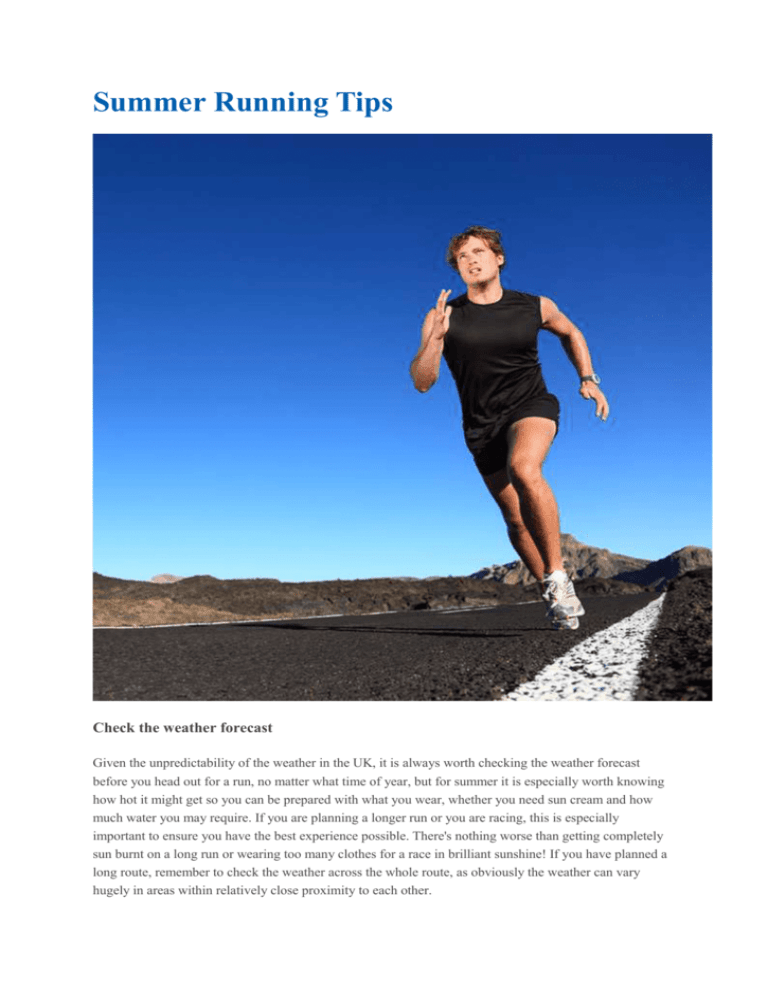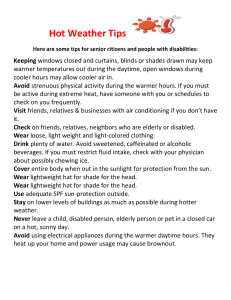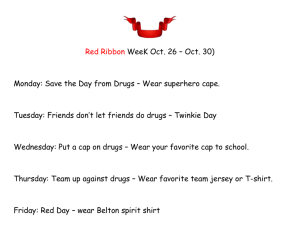Summer Running Tips
advertisement

Summer Running Tips Check the weather forecast Given the unpredictability of the weather in the UK, it is always worth checking the weather forecast before you head out for a run, no matter what time of year, but for summer it is especially worth knowing how hot it might get so you can be prepared with what you wear, whether you need sun cream and how much water you may require. If you are planning a longer run or you are racing, this is especially important to ensure you have the best experience possible. There's nothing worse than getting completely sun burnt on a long run or wearing too many clothes for a race in brilliant sunshine! If you have planned a long route, remember to check the weather across the whole route, as obviously the weather can vary hugely in areas within relatively close proximity to each other. Plan how much water you might need If the weather forecast is for warmer conditions then make sure you consider how much fluid you will need to take on. This includes considering how much water you need to drink the day before, in order to best prepare yourself for your run the following day. Again this is most important when you are doing a long run or racing, but applies to all runs to some extent. Dress accordingly The fact that it can be cold and wet one day and clear blue skies and very hot the next means that it can be difficult to decide what to wear out running. In summer, I would always go with as little gear as possible, as it is most likely that by the time you've been running a few minutes you will heat up, even on a colder day, after all it is the summer. What you wear will depend on how long you plan to be out running and whether there are any big changes in the weather predicted whilst you are going to be out. If it is forecast to get very wet and you plan to be out for a few hours then best take a waterproof. However, if you are doing just a shorter run these considerations are not so important. Plan your route Planning your route is important in order to avoid getting lost, especially in warmer weather when you don't want to find yourself lost with no water left. Also, the route you take will influence what you wear, due to differences in weather - from say up in the hills to an inner city route. If you're planning a mix of terrain then you will need to prepare accordingly: for example, the shoes you choose to wear, and also whether you take an extra layer with you. Know your limits It is important to know your limits as a runner, and this can be judged by the level of experience and the type of experience you have as a runner. If it is a very hot day and you are not used to running in hot conditions then it may be worthwhile to amend your training plan for the day. For example, if you planned to do a 16-mile run, perhaps do a slightly shorter run instead, say 10 miles. You might not react well to the heat, so it is always best to be cautious. You can then take that experience to inform your training decisions the next time the weather is hot. If you were largely unaffected by the heat then you will know you can do the 16 miles; if you struggled, then you will know to perhaps swap your long run for a shorter run, or do some cross training in the gym instead. Take appropriate gear e.g. your phone This is particularly important if you are running in an area you don't know very well - you may be out running on holiday for example. It is a good idea to take your mobile phone with you in case you find yourself lost, or in need of water or food, and don't know where the nearest shop might be. It is also a good idea if you are out running in the hills or even just out for a long run. In the summer you may not feel it to be so necessary, as the days are long and the weather usually better, but it can get surprisingly ho,t and this can be as much of an issue as hazardous wintry weather! If it's clear blue skies, wear sun screen! This seems like an amazingly basic point to make but it is surprising how many runners don't think about it. I know you are not going out sunbathing, but being out running you are still exposing yourself to the sun, and when the weather is good you don't want to have to spend the rest of the day indoors suffering from sun stroke! Sometimes the wind disguises how warm it really is so you should always check the weather for how much or little cloud cover there may be. Reassess your target run/race time accordingly This is especially important if you are racing, as we all have races we really want to achieve a specific time in. However, if the weather is very hot, then it is definitely worth reassessing your target time accordingly. You can consider here how much of your training was done in warmer weather, and how you usually cope in these conditions, then judge a suitable target time from there. This can of course apply to training runs as well. It is good to reassess your time and then still have a target, as opposed to trying for your original time and feeling de-motivated when you realise you're not going to achieve it in the current conditions.






![Lab Safety Notes [8/31/2015]](http://s3.studylib.net/store/data/006888939_1-6bb01d0df93e4bd7262a0fecabf05a75-300x300.png)